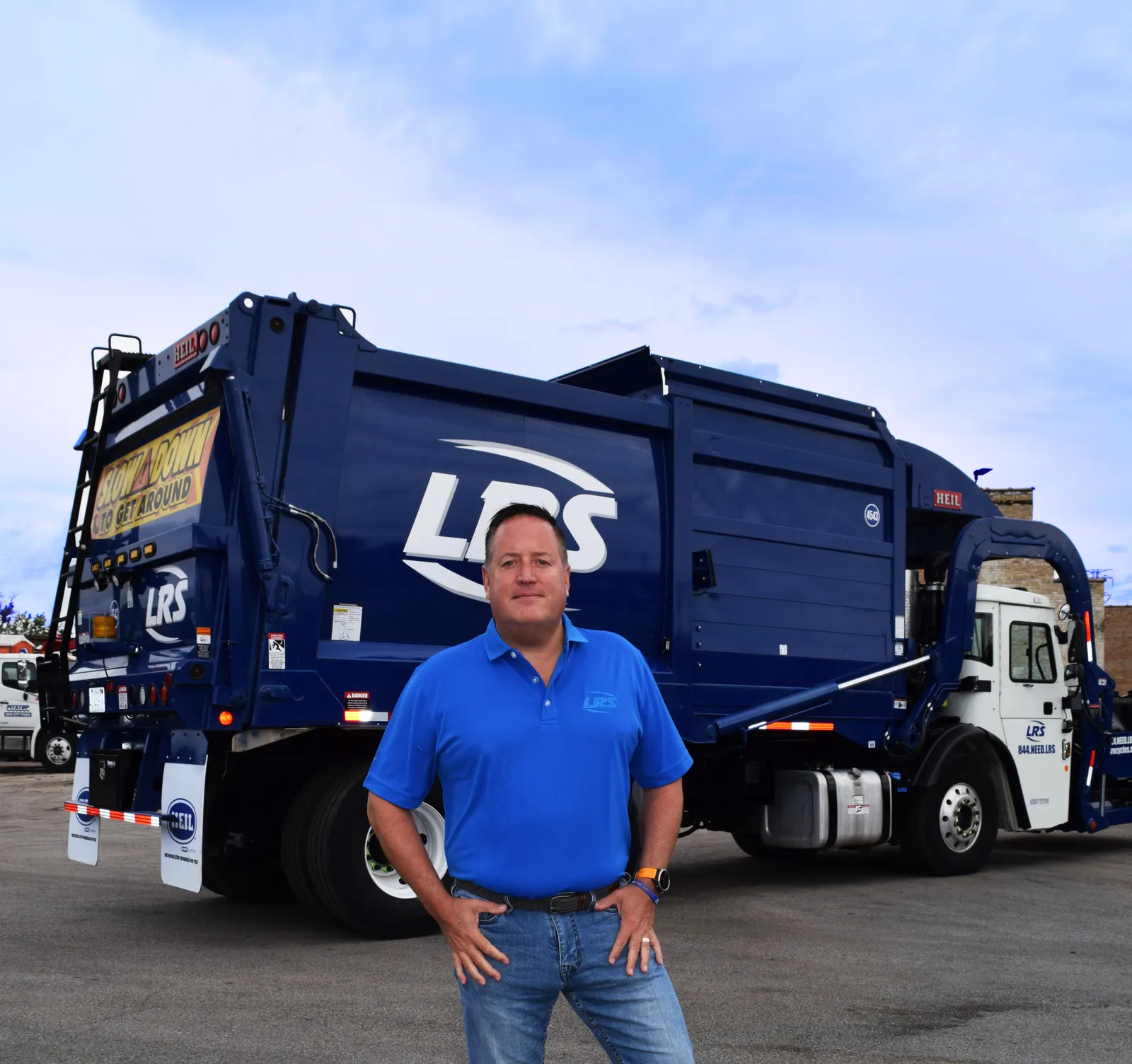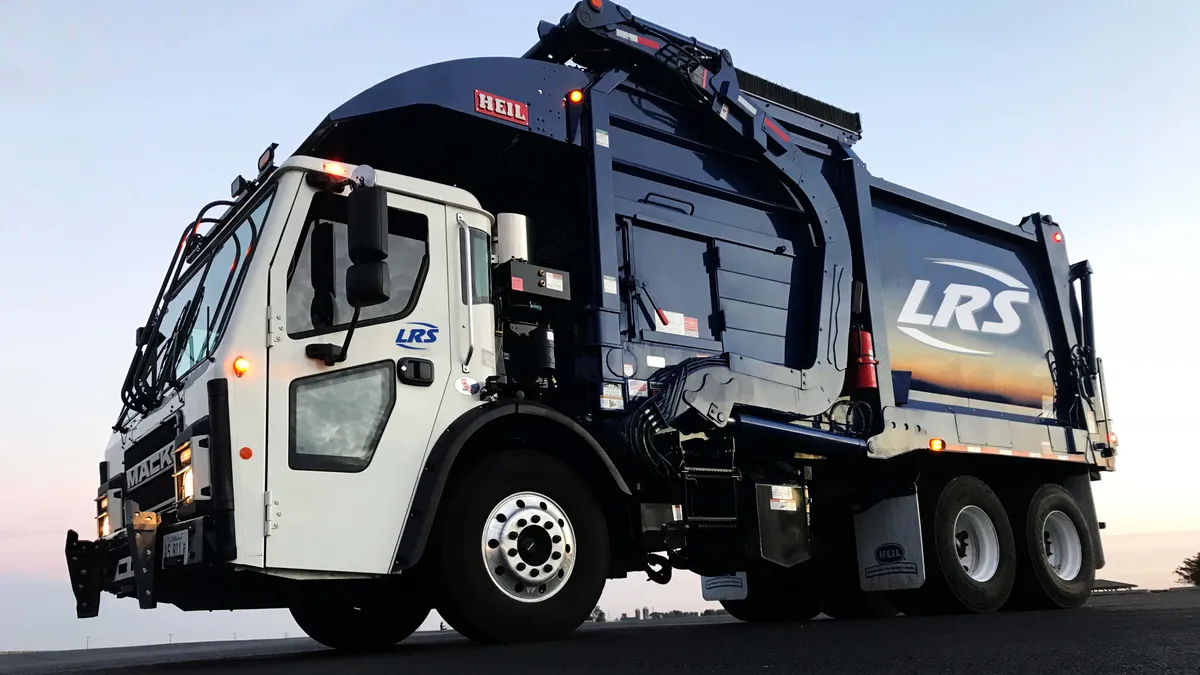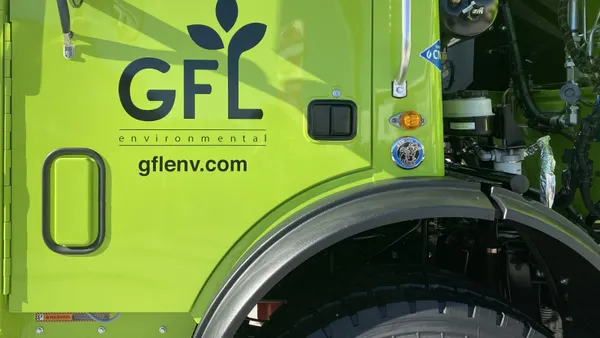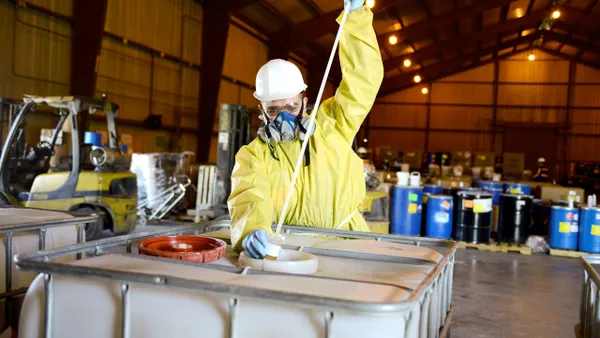When industry observers talk about some of the nation’s fastest-growing waste companies, LRS is often near the top of that list. The Illinois-based operation has expanded significantly in recent years and sees much more runway ahead.
Founded in 2013, with an initial focus on the Chicago market, the company is now in 10 states: Arkansas, Illinois, Indiana, Iowa, Kansas, Michigan, Minnesota, Mississippi, Tennessee and Wisconsin. Last summer, a division of Macquarie Asset Management bought out multiple investors — including Goldman Sachs — with plans to accelerate the company’s growth.
Following 22 acquisitions last year, and 10 so far this year, CEO Alan Handley now anticipates the company is on pace for a $600 million revenue rate. That is more than double the revenue projected at the time of the Macquarie transaction just one year ago.
Today, the company has more than 2,100 employees, 1,700 vehicles, nearly 2 million customers and 80 facilities. That portfolio includes multiple recycling facilities and transfer stations, plus three landfills — two of which have gas collection systems, following a recent project at LRS’ Eco Hill site in Illinois. Deals announced this month have included expansions in Arkansas, Indiana and Illinois, among others.
During a recent interview, Handley hinted at other transactions that could change the company’s scale “fairly dramatically,” talked about a new Chicago MRF set to open in 2023, explained how portable restrooms fit into the LRS growth strategy, previewed ESG reporting plans and more.
The following interview has been edited for clarity and brevity.
WASTE DIVE: In thinking about the deals you’ve done so far this year, are any of them transformative in terms of entering new markets or new business lines?

ALAN HANDLEY: There's two very large deals that we're working on that would be transformative. They're large, meaty, north of $25 million EBITDA kind of companies.
Our strategy in 2022 was to take the platform-oriented companies we bought last year in Minnesota, Iowa, Arkansas and Nashville, and then just do tuck-in acquisitions and densify those markets. So we really have been focused on doing exactly that. We take nice companies, well-run good teams, and we just roll them into the platforms we acquired in 2021.
Some of this year’s deals have included portable restroom companies. How does that fit into the growth plan?
Portables are a great asymmetric play. It's not typically what you'd consider solid waste, but it does sell in through almost all of our other channels. It sells into our roll-off division, it sells into our municipal division. And then just the standalone entity does really, really well.
The strategy there is to take and use it either as a leader — so we will buy a platform-sized, portable company and then we'll build other divisions around it that fit into our core DNA: recycling or commercial, residential, wherever it might be — or invert it. So we'll buy a company that has a large C&D or recycling presence with a roll-off division or something like that and then we'll introduce the portables.
It’s very good free cash flow, not a lot of [capital expenditures], great operating margins, lower disposal costs, easier to find drivers. It's just generally a business that we've come to like quite a bit. It's about twice what we get on a normal operating margin. It's high on the service side. You can't run a sloppy portable restroom business. It's all about service, it's all about the customer relationship, and those are two things that we do well. This feeds nicely into what we're already set up and doing.
Sustainability has always been a part of your business proposition, but what should we expect to see from LRS on the formal ESG side in the next couple years?
As we mature and we grow and we get more scale, I think we're gonna have to follow more of the formal protocols that are out there. So this will be the first year that we've participated in the GRESB materiality assessment. That will be our first year of formally tracking and reporting. Then next year we'll baseline that in our first formal sustainability report that will be published.
It's always been something that we do and we do I think better than a lot. We recycle a ton. If you look at all the beneficial reuse that we produce, the company as a whole is a fairly unique example in the waste space as far as how much we're already doing on the ESG front.
Speaking of recycling, LRS is working on a greenfield MRF project in Chicago. What can you share about where that project stands?
Outside of probably Rumpke in Columbus it'll be the largest new single-stream MRF built in the Midwest. It's state of the art. We designed it to basically eliminate as much human input as possible in the process. It's heavily, heavily automated, both with robotics and opticals, and it literally is in the center of the city of Chicago. It’ll be the largest and only recycling center that sits inside of the city proper.
I personally think it's gonna change the face of recycling for the city of Chicago. I've been working on that thing and talking about that since 2015. It's been seven years of trying to get that vision materialized and it’s finally up. I just walked through there today and it was awesome.
I imagine getting the new city recycling contract last year was a helpful step in that direction?
The issue with last year and winning that Blue Cart program was that it essentially used up all of our free capacity that we had in our existing infrastructure. So it took a situation where it was a want — where I kept saying I want to build this state of-the-art recycling facility in the city — to a need. It worked well, because that gave us the impetus to push that forward.
Are you seeing any desire or opportunity in your markets to do more organics hauling or processing?
It comes up a lot. In Minneapolis, obviously they're much further along than say Chicago or some of the other cities that we work in. We have been in active conversations with various municipalities and cities to try to figure out a way to either do some type of collection program, anaerobic digestion, etc.
I'd say we're in pretty early stages. There’s actually a recent project that we're whiteboarding. But these projects take really almost a public-private partnership. It's not a commercial relationship in the truest sense. It's gonna have to be something where the city, government, whatever it might be, will have to take some risk.
We’re going to bid on one in a bigger city, but again it's more of a PPP. It's not really me doing a commercial deal. It's sort of a partnership where I get 100% of the waste that's collected — we may or may not collect the waste — we would process it, we would feed the gas back into the mains. So there are some creative ideas that are going around and I'm excited about the vision.
Another topic that has been coming up a lot lately is the economy. Are you seeing any leading indicators of a possible recession or downturn in any of your volumes?
No, not at all. We really have had outstanding volumes across our entire network. Record volumes at all the MRFs, record volumes at all the C&D recycling facilities and record volumes at all the MSW [sites]. It's been a hell of a year on the volume side. I haven't seen anything yet. There's always rumblings, but it has not translated into frontline operation metrics.
You’re about a year into the Macquarie ownership and have been very active with acquisitions. How much bigger can LRS get with this backing behind you?
Oh it can get big. My goal is to drive this business to at least a billion dollars or more over the next couple of years. With Macquarie now behind us on the equity side there really is no reason why I won't achieve that goal, based on what I have in front of me on the M&A side and also on the organic side. So the marriage of LRS with Macquarie has really given me the ammunition or the firepower to achieve what we set out to achieve three or four years ago, and then do it in a much probably more rapid fashion. I'm more convinced of that than ever.
Do you still see LRS likely staying private or could the company go public in the future?
I think it's too early to say. Right now what I tell our stakeholders and I tell our employees, and even the board, is my team's goal is to grow the business: To grow profitably, to improve operating margins, to vertically integrate as much as we possibly can where we need to be vertically integrated, keep our recycling DNA. And then let the people who are probably more financially oriented figure out what they want to do when and if we hit the numbers that we say we can deliver. I figure we grow a profitable company and the rest of it will figure itself out.












